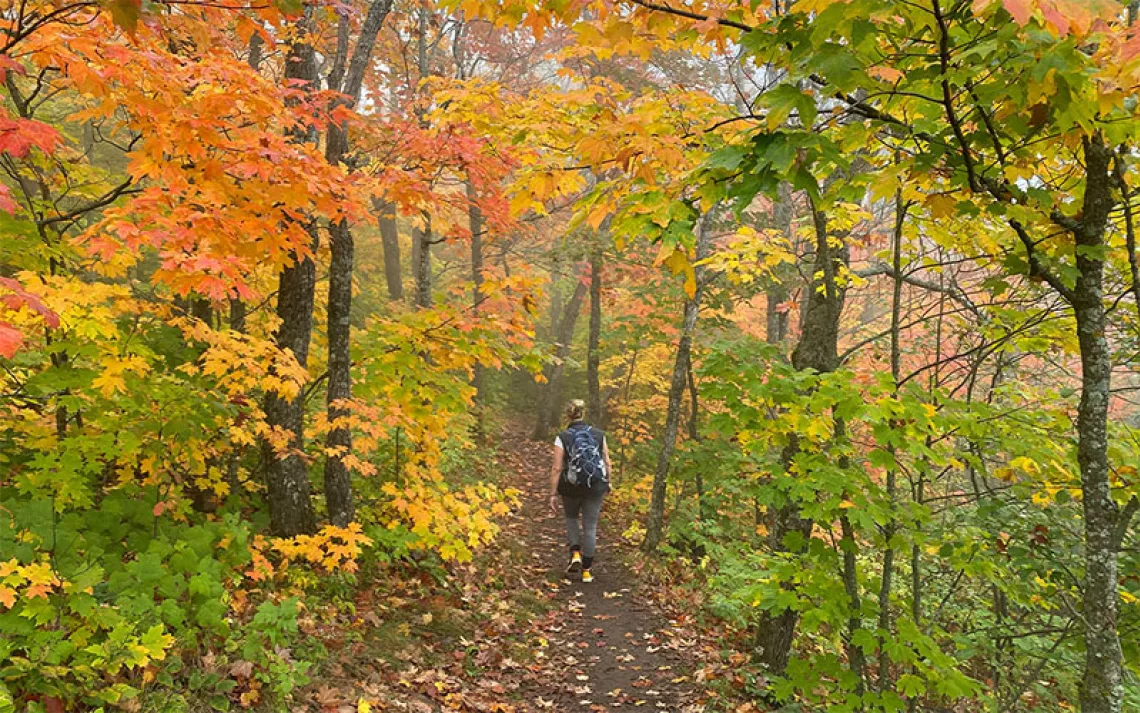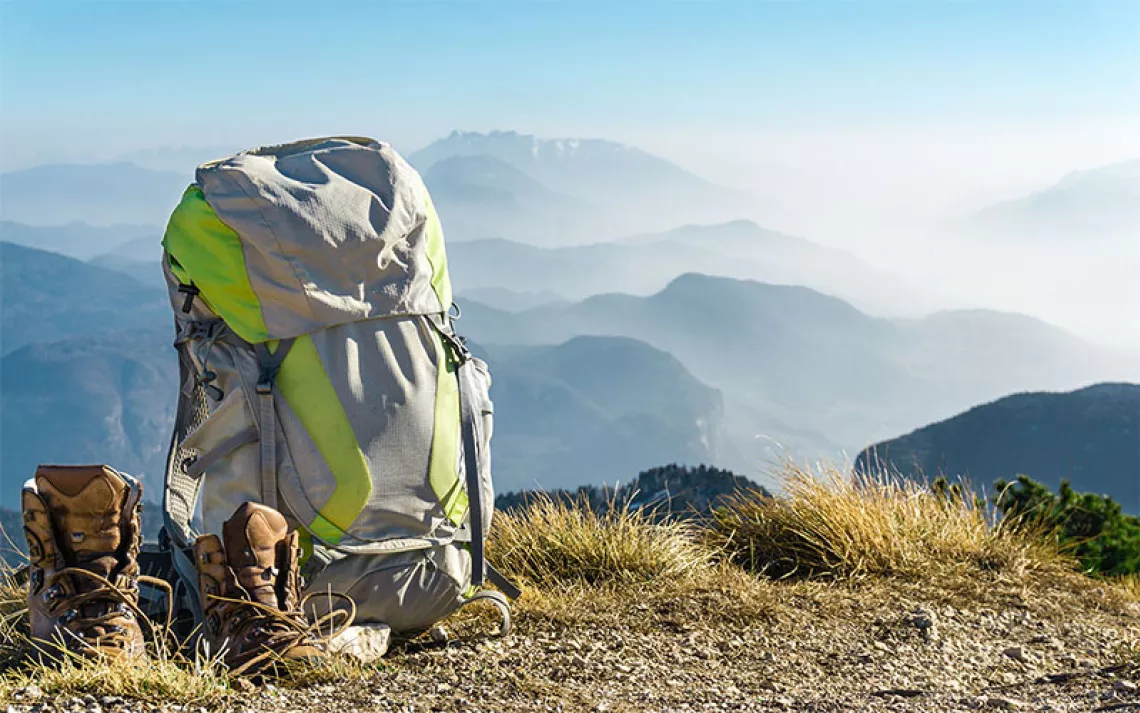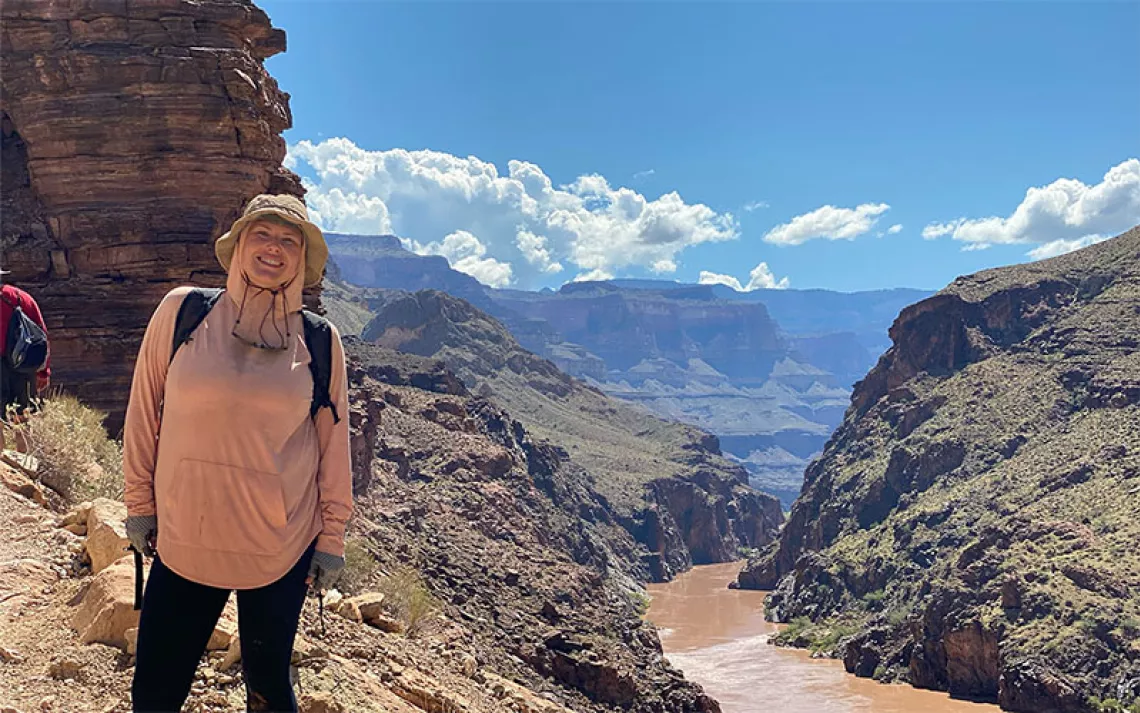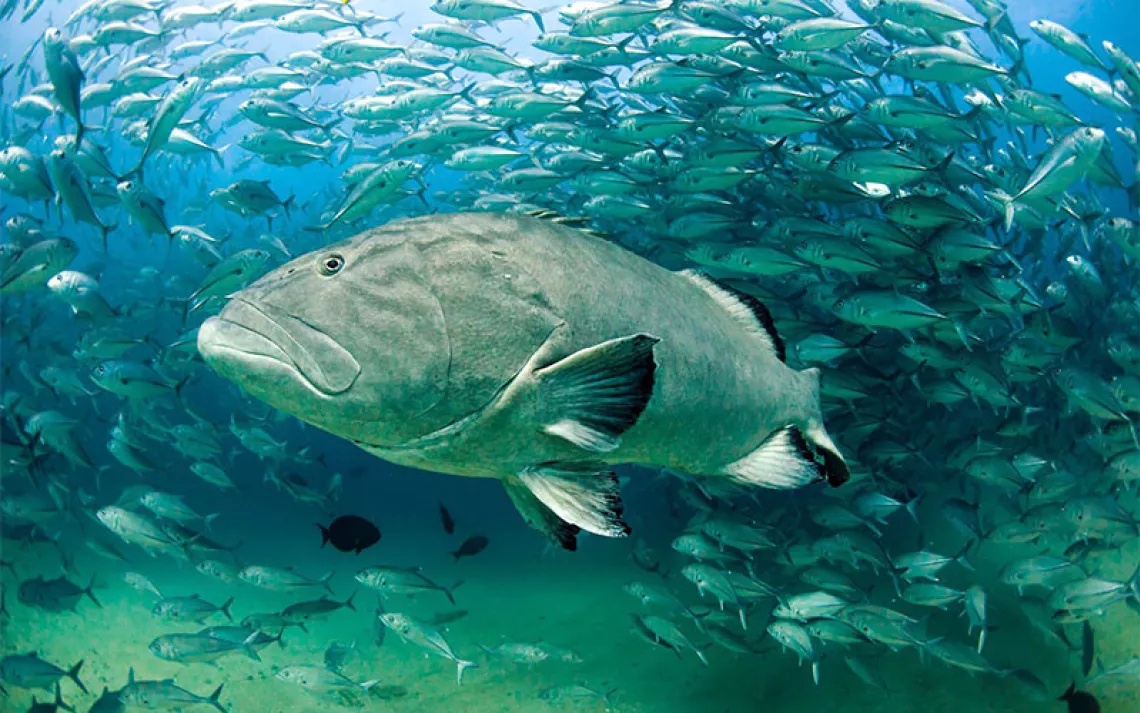How Does Vegan Ultramarathoner Scott Jurek Do It?

Photo by Justin Bastien
An ultramarathoner is someone who regularly runs races that make the standard 26.2-mile contest look like a morning jog. Scott Jurek, 37, is an ultra ultramarathoner. He's the U.S. record holder for the 24-hour run, fitting 165.7 miles into a single day. Twice he's won the brutal Badwater race—that's 135 miles through Death Valley—and he's won the 100-mile Western States Endurance Run seven times. He does it all on a diet devoid of animal products. In his free time, he helps restore the mountain trails so central to his sport. We had a few questions for him.
How long have you been vegan?
Since 1999. I started doing ultramarathons in '94, but all my major victories happened after I changed my diet. I was able to train the way I did because of the diet and the way it helped me recover. It was a gradual journey, learning what I could do as a vegan. It wasn’t like I transitioned in one day, it was gradual. But it was one of those things that really impacted my health and recovery and training, and it’s been a big reason for why I’ve been so consistent with races and pumping out serious results. I’m 37 and my knees feel great, my body isn’t destroyed. A lot of people think ultramarathoning has long-term damaging effects on your body. That’s where I feel like the diet has played a huge role. As a result of it, my body is able to withstand all the demands I put on it. It’s longevity in the sport.
What made you want to go vegan?
My mother was diagnosed with multiple sclerosis when I was very young. So that had a huge impact, seeing what disease can do. And as a physical therapist, working in hospitals and seeing chronic illness. Even though I was treating people on a muscular and neurological level, it was very apparent that what people eat destines long-term health. At the time, I was eating fast food four times a week, you name it—extra-large fries, double McChicken sandwich. I used to hate vegetables. And I used to hate running. I could have never have seen myself as this. I used to hunt and fish. In my family, that’s how we explored the outdoors.
A major turning point, besides having disease in the family, was reading Dr. Andrew Weil’s book Spontaneous Healing, and then Howard Lyman's Mad Cowboy. Weil’s book got me really inspired, and then the turning point in going vegan was Mad Cowboy. Not only seeing the health benefits and issues with eating animal foods, it was the environmental edge too that made me really start to realize, OK, how can I have a bigger impact? Because I love and enjoy the wilderness and the wild places that I run in.
Is your veganism more connected to health, the environment, ethics, or all three?
Definitely it got spurred from the health standpoint. But then as I read more and became more educated, I realized that our three meals per day play a huge role environmentally. So those are the two mainstays, and I’ve definitely come to appreciate the ethical issues too. As a former hunter and fisherman, I'm sympathetic to people who do those activities, but I'm also sympathetic to the fact that we do mistreat animals raised for food. I have a very close relationship with animals, so I’m definitely not a fan of how we do that.
We always hear about the health benefits of a vegan diet. Can you talk a bit about the environmental benefits?
To produce meat in this country is very energy intensive. Granted, I do eat vegetables that come from California from time to time, but it’s a much greater issue. I’ve read that it takes 14 pounds of grain to produce one pound of meat. When I look at it on paper, it doesn’t make sense. And the water-pollution issues, just look at North Carolina with the hog farms, look at the feeding lots out West for beef. A lot of pollutants get put into waterways. I don't think everybody can be fully plant-based, but I think eating more plants and less animal products is really the way to go from an environmental standpoint. It’s traditionally what people are used to—in the past, we couldn’t afford to eat animal products at the rate that we do now.
Why vegan and not just vegetarian?
Definitely Howard Lyman’s Mad Cowboy answered that question for me. I was pretty happy being vegetarian, and I felt like, OK, I’m doing my part, I’m improving my health. But once I read his book, I realized that through the dairy, through the eggs, and through all the other non-vegan products, there's a huge impact from a health and environmental standpoint. There also some links with my mother’s dealing with multiple sclerosis, with the dairy. It was also a great challenge. I love learning about new foods, I love to cook, and I’m actually working on a cookbook right now. It was really a fun exploration. I didn’t look at it like, “Oh, I can’t eat this and I can’t eat that.” Maybe I missed a few things initially but after a while, it brought so many more opportunities to explore new foods, to explore new ways of cooking.
You’re working on a book?
Yes. Eat and Run. It’s a memoir-biography with nutritional advice and recipes. Just basically my journey through running and nutrition. Houghton Mifflin is publishing it in spring 2012.
How do you deal with restaurants?
Restaurants usually are pretty good. In rural areas, it gets tricky for sure. Sometimes I have to be creative in finding a protein source but they'll always have something, whether it’s from the salad bar, or I’ll ask the cook if they have legumes on hand. Ethnic restaurants are pretty easy, especially Asian or Mexican ones, they usually have beans. But often they can make something without dairy, or stop before they add the dairy. Sometimes it does get a little sparse. But I’ll bring protein powder when I’m traveling and need to supplement. At home, I enjoy cooking so much that it's not an issue. The diet has encouraged me to prepare meals, which I enjoy. I think that’s one of the benefits of a plant-based diet, it encourages you to make your own food, and you’re much more involved in the process. As an athlete, I want to know exactly what I’m putting into my body.
You run mainly on trails, right?
Yes. I've ventured on roads for some events, but my first choice would be run on mountain trails. I can find enjoyment wherever I might be, whether that’s Central Park in the middle of New York City or just traveling on a major road. And that’s the beauty of running: You don’t need the perfect setting. You just need your two feet, and to move forward. But running in the mountains reminds me of my childhood and brings me back. It's more play. I grew up in the country and loved being outdoors. Having such a beautiful setting, it brings you back to that primal instinct of running on a trail. There are a lot of cultures in the world that have been built around running. There’s this instinctual pattern of running out in the wilderness. So when I'm on, for instance, a 40-mile run, I get to explore places that would take most people four days of backpacking, and I get to do that very minimally, impact-wise. A lot of people are like, “Well, how do you get to enjoy it if you’re running?” But I’m moving through this incredible scenery in this incredible environment, still soaking in the sights and sounds and smells. When I push my body, I explore these boundaries of how far, how fast can I go, and being in a wild setting helps increase the awareness, the extremeness of the elements. Being out in the wilderness leaves a lot open to what can happen.
When you’re running outdoors, do you feel like it’s you versus the scenery? Or do you just feel very connected to nature?
It’s like working with nature. I think this is evident in all the disasters that occur: Nature is boss. That’s why I feel so humbled being in such a large arena. In the mountains, everything’s just so massive, and I feel like this little speck. I’m just like any other animal out here. I’m a part of it, versus trying to control it. I mean, I’m obviously trying to make myself comfortable to be able to get through those difficult moments out there, but I’m not trying to fight it.
What’s your favorite place to run?
If I were to be really vague, I’d say that it doesn’t always have to be majestic. Give me a ribbon of single-track dirt trail somewhere and I’m happy, and that could be my favorite place. But I guess I’d have to say somewhere with mountains. In Seattle, Mount Rainier National Park was a favorite, and there’s open space very close to Boulder, Indian Peaks Wilderness, that ranks very high on my list. National parks are always great.
If you could run in only one place for the rest of your life, where would that be?
The Alps. In France, near Chamonix and Mont Blanc, is pretty spectacular. If you want a U.S. one, I’d have to say in the Sierras. Yosemite is pretty awe-inspiring. Anywhere on the John Muir Trail. Until you put yourself in the arena, you don't realize how massive and amazing the mountains are. Just how big everything is.
Are runners are more likely to be environmentalists?
As a rule, runners tend to be very knowledgeable about their surroundings, particularly trail runners. We wouldn’t be able to enjoy some of the places that we do if cars were rushing by. But even within the road-running scene, there's a movement toward it. Air quality is huge. You might not need wild places to run on roads, but in order to run anywhere, even in the city, we need clean air. So, yeah, I'd say runners are more environmentalist.
Do you consider yourself a conservationist?
Yeah, a lot. I’m really involved in doing trail maintenance. I’ve done a lot of speaking for different groups, and it’s something I want to become more involved with. Trail maintenance is something, as we get fewer and fewer funds, that more and more people are going to start to have to do. It’s definitely becoming an issue. I’ve done a lot of work with the Washington Trails Association and local hiking clubs. Runners get a bad rap sometimes because they don’t always have the best relationship with hikers. Just like with mountain bikers, and people who ride horses, everybody has to come together. We all have to realize we all have the same goal. If we all want to enjoy all the same places, we all need to put time and effort into maintaining and protecting them.
What are your favorite foods to eat before, during, and after a long run?
Before, I usually do a smoothie. That’s a way for me to combine a dense source of calories. I put in everything from Udo’s oil to fruit, almonds, coconut, usually a protein powder, and just create this dense liquid meal. That’s a staple. Sometimes I’ll do sprouted wheat bread with almond butter or a multigrain porridge, but a smoothie is my staple breakfast. During runs, I use sport foods and am a big fan of the Clif products, because of their environmental efforts and what they stand for, but also because of the quality of their products. It’s really hard to find sport foods like gels and drinks that are organic, and they’ve placed a huge importance on that. But it’s always good to add things like a burrito. People are always surprised when they see me during a race eating a burrito or a falafel wrap. But when I’m out for six, seven hours, I love to sit on a mountain pass and just enjoy a good hummus wrap or a bean-and-rice burrito. Real food like that. I just pop it out of my waist pack. After a run, it’s really important to get a good mix of a little bit of carbohydrates mixed with protein. So I’ll whip up a post-run recovery smoothie or a good burrito. Mexican food is always good. If I’m at home making something, it’ll be tempeh or a good grain like quinoa, plus steamed vegetables, like a stir-fry.
Do you ever crave meat or dairy?
You know, I don’t. When traveling, it gets tough, especially in Europe and remote places. But I never have a craving for a steak. Sometimes it's harder with cheese, because it’s in a lot of stuff. I don’t necessarily have a craving for it, but it does make it a little harder when you’re ordering pizza and everyone else wants cheese. It’s not that I detest these things, it’s just I’ve lost the craving for those fat sources. The one thing a lot of endurance athletes sometimes cut way too low when they go vegetarian or vegan is their fat intake. So when they do feel low in energy, a lot of times it’s because they’ve cut out so much that they actually are on a lower calorie intake, so of course you’re going to feel tired and not have much energy. A lot of people say, “Oh yeah, once I started eating meat I started feeling so much better.” So that’s the thing with the Udo’s oil, it gets all my essential fatty acids in. For some people it’s incorporating the iron sources, the dark leafy greens. Because you know, you can eat a really crappy vegetarian diet. It can be very deficient. But eating a well-rounded array of fruits and vegetables and legumes and minimally processed soy food is key.
What are your favorite shoes to run in?
I run in the Brooks Cascadia. I might be biased because they’ve been a sponsor of mine for seven years, and I helped them design the first Cascadia. That shoe has been one of the top trail-running shoes, and a favorite among people who are fast-packers. It’s a good all-around shoe. I continue to work with the designers, and the cool thing is that Brooks is committed to incorporating green and sustainable elements into their shoes. The outsole will have recycled rubber content in the new version of the shoe that’s coming out next year. The green rubber actually has better wear and better surface grip on a wider variety of surfaces.
What do you think of the barefoot running trend?
I think it’s great. It gets kinda tricky since I run for a shoe company and I run in shoes. But it’s a movement within running that’s invigorating new ideas as far as shoe design. For instance, a new trail shoe that I’m working on right now, which’ll be coming out in the fall, is the Brooks Pure Grit. The idea behind that came from going down to the Upper Canyon, and getting ideas from the sandals that the Tarahumara wear. The whole barefoot movement has been good for shoe companies. It’s encouraging them to rethink design. It’s getting people inspired to go running. Running barefoot is this new challenge. It forces you to pay attention to your technique. For me personally, I use it more as a training tool. I’ll go do some barefoot miles after a track workout, or for strengthening, like out on the beach in the sand. But as far as running 20 miles on the trail [laughs] . . . it’s however people want to explore the act of running. It’s great for technique and body awareness, but like anything, you have to start very slowly and gradually build up to it.
You started out as a skier, right? Do you still ski?
Yes, true. And yes, I still ski. I love to be out there.
What advice would you give others who aspire to be ultramarathoners?
My big piece of advice is: Anybody can run an ultramarathon. Of course it takes some training, but in the end, it boils down to more of a mental challenge. People say running 100 miles is crazy, it’s hard, I could never do that, but when you open your mind to the possibility of doing something like an ultramarathon, it’s completely possible. So my advice would be: Keep your mind open. Be willing to explore the boundaries. Never limit yourself, and listen to your body. For me, running’s a lifestyle. It’s about balancing nutrition, it’s about keeping my body healthy on all levels. To me, running is more than just putting miles in. Connect with clubs and running groups, and have a training partner to learn from too, who might be older, might be slower, but it’s always good to learn from veterans of the sport. The key thing is, keep it fun. Always try to find the joy in it. Sometimes I have to train to race to win, and I always try to remind myself that there’s fun in hard work and pushing the body to its limits.
What about people who can’t take the time off work to train?
I know people who train very little during the week, or they may only get in one long run per week, and they’ve only got a few hours when they do that. I know people who run 100-mile races on 30, 40 miles a week. It’s possible. I know some people with family commitments and that economically just can’t take the time. But you can find little ways to can carve out time, to combine it with other activities. Running can be your transportation to and from work, or to and from errands. If running races isn’t economically feasible, if you can’t make the time commitment to do something big, remember that anybody can have a challenge, whether it’s in the city or in the wilderness. Get out and do bits and pieces. Find goals that help you explore your limits but that don’t take away too much from family or work commitments.
How do you keep going?
Sometimes my body is really tired. But those are the experiences I remember most, getting through that storm or getting past a difficult trail section. Things come more alive. That’s why I think I keep doing this sport. I’ve been doing it for 17 years now, and the reason I keep coming back is for those glimpses of flow. I wish it happened every time. Runners or climbers, anyone pushing their body, we’re always searching for those moments, and we’d like them to happen more. Sometimes I don’t know when it’s going to happen. It just hits me on a trail. And a lot of times it happens, yes, getting through adversity or difficult moments, but sometimes it can happen where everything’s just clicking and going right, and the present moment is the only thing that really matters. My senses become very acute and aware of what’s going on and it just seems like everything is going perfect. It’s pretty amazing.
 The Magazine of The Sierra Club
The Magazine of The Sierra Club



